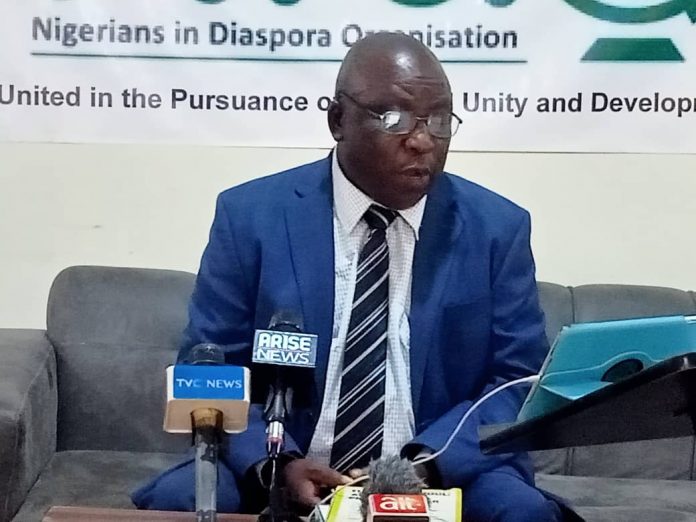By Daniel Kateng
The Nigerians in Diaspora Organization (NIDO) has expressed disappointment over the failure of Independent National Electoral Commission (INEC) to transmit electronically the presidential election results into it server from the polling units as promised Nigerians.
Chairman of Nigerians in Diaspora- America, Dr. Ezekiel Macham and his European counterparts, Dr. Bashir Obasekola disclosed this at the weekend in Jos during a press conference while presenting the 2023 election observers mission of Nigeria in Diaspora Organization on the Presidential and National Assembly elections.
Members who joint the press conference via zoom urged INEC to improve on the electoral process before the Saturday 11 March, 2023 Governorship election and ensure Diaspora voting in the subsequent elections.
“The inability of INEC to fulfill the anticipated electronic transmission of the results of the elections to the INEC server was very disappointing, and this greatly punctured the trust of the voters in the sanctity and transparency of the electoral process.
“INEC should urgently reverse this trend for the sake of sustainability of our democracy. INEC should maximize the potential for transparency that BVAS and IReV provide.”
He acknowledged INEC determination to bring on board new innovations with a view to improve the electoral process, saying Nigerians in Diaspora were displeased with the systematic failure of the Commission to ensure instantaneous transmission of results to IReV at the conclusion of voting at the polling units as earlier planned.
“It is very important that as we move into the future, INEC must seek an amendment to the Electoral Act to allow electronic transmission and automated collation through direct submission of results in numerical format from the polling units into the INEC server.
“The submitted results must be free of human intervention, which occurs by way of the manual addition of numbers. The automated tallied results should be alive and accessible to the nation as the voting progresses. The scanned hard copy evidence of Form EC8A transmitted via BVAS will be used only to back-up the raw data submitted from the polling units.”
Dr. Macham who read the press text noted with dismay the late arrival of electoral materials in some polling units across the country, stressing that voting period was grossly inadequate, “six hours was not enough for citizens to exercise their franchise”.
He observed that the proficiency of INEC ad-hoc staff in some polling units across the country fell short of the expectations of Nigerians and called for the usage of more experience personnels in the subsequent elections.
Dr. Macham described as noble the introduction of Bimodal Voter Accreditation System (BVAS) into the electoral process, adding that the usage helped in reducing cases of manual manipulation of figures and problem of over-voting.
“We advise that INEC and all pertinent stakeholders take urgent action to address the lapses identified in this report with a view to improving the conduct of the subsequent elections, including the upcoming March 11, 2023 Governorship and States Assembly elections” he stated.

Call:
Sandra - 07069148333
Pauline - 08174374150
Scholastica - 09060678434













